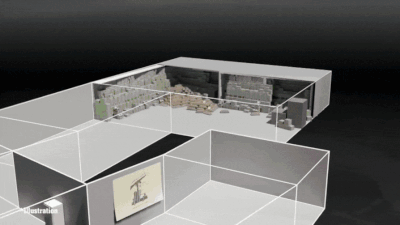Israel military has claimed the discovery of hundreds of millions of dollars in cash and gold in a bunker beneath a hospital in Beirut on Monday.
Israel’s military said that it would not target the facility, continuing instead with strikes on Hezbollah’s financial assets elsewhere.
Rear Admiral Daniel Hagari, Israel’s chief military spokesman said in a televised address that the bunker was constructed under the Al-Sahel Hospital by Hezbollah’s former leader, Sayyed Hassan Nasrallah, who Israel killed last month.
The facility, according to Hagari, was built with the intention of sustaining long-term stays and currently holds vast sums of money.
“There are hundreds of millions of dollars in cash and gold inside the bunker right now,” Hagari said, urging the Lebanese government and international organizations to act. “Don’t allow Hezbollah to use the money for terror and to attack Israel.”
While making these allegations, Hagari clarified that the Israeli Air Force, which has been monitoring the site, would refrain from striking the hospital itself. The claims, Israel said, were based on years of intelligence.
Fadi Alameh, a Lebanese lawmaker affiliated with the Shi’ite Amal Movement and the director of Al-Sahel Hospital, dismissed Israel’s assertions, branding them as “false and slanderous.”
Speaking to Reuters, Alameh called on the Lebanese Army to inspect the hospital to verify its contents, which he said included only operating rooms, patients, and a morgue.
Alameh added that the hospital was in the process of evacuation, though he did not indicate any immediate threat of Israeli attack. He expressed concern over the potential implications of Israel’s allegations but reaffirmed the hospital’s innocence.
Meanwhile, Israel’s military efforts against Hezbollah persisted, as Israeli chief of the general staff Herzi Halevi confirmed to troops that between Sunday and Monday, Israeli aircraft had struck around 30 sites linked to Al-Qard al-Hassan, an entity Israel identifies as Hezbollah’s financial arm. Hagari signaled that more strikes against Hezbollah’s financial infrastructure would follow in the days ahead.
Hezbollah and Israel have been locked in a cycle of tit-for-tat fire since October of last year, when Hezbollah declared its solidarity with the Palestinians following the outbreak of war in Gaza. What began as a show of support has since escalated into routine exchanges of fire across the Lebanese-Israeli border, placing the region on edge.
In late September, Israel announced a “new phase” of the war, expanding operations against Hezbollah and vowing to make northern Israel safe from the militant group’s strikes. This shift has led to an uptick in Israeli military activity, with Hezbollah’s financial infrastructure now in the crosshairs.
